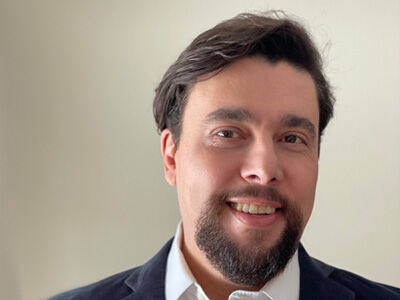Last year, as the pandemic wore on, Andre Avila Ferraz, a Boston-based senior engineering manager with Hewlett Packard Enterprise (HPE), was trying to figure out how to engage with his global engineering support team. In the past, he would bring 10 to 15 people together in Boston to provide high-level training, allowing them to get their hands on and work with HPE’s servers and products so they could provide Level 3 support for HPE customers. When employees were forced to work from home, however, his training opportunities were greatly diminished, and he became inspired by the experience of his coursework at MIT Sloan Executive Education.
“I needed to deliver to those engineers, but a lecture was not going to be enough. So I came up with this idea,” says Ferraz, who has been with Hewlett Packard Enterprise for two decades, working in both Brazil and Boston in several positions. “We invested in some high definition cameras and other video equipment, and we started broadcasting live classes from our lab in Atlanta. The engineers needed to see the servers and look at the circuits to understand how the technology works. Then we could go through the process of troubleshooting issues. We had feeds from five different live cameras, and it worked so well. We had people telling us it was much better than face-to-face training because when we zoomed in on the circuit boards, they could see the details that they usually couldn’t see in person. I also went from being able to train 15 people at a time to hundreds of people at once. It was amazing.”
Ferraz replicated the live online experience he had taking MIT courses such as Building Great Teams: The Enterprise Leader’s Playbook and Managing Complex Technical Projects, which helped him earn his Executive Certificate in Management and Leadership in 2021. He began his journey with Executive Education in 2020 after trying online programs through such institutions as Harvard and Yale. However, Ferraz was looking for a very specific type of education—one he found at MIT Sloan.
Fantastic Frameworks
“With my technical background, I was sure that MIT’s methodology and the way things are taught there would work well for me,” Ferraz explains. “Executive Education uses frameworks as a way to teach you, and that works with the way that I think and the way that I work with my engineering team. With frameworks, you follow steps. It gives you a flow and a process. It helps you define and organize actions that need to be implemented.”
With Ferraz’s first course, Artificial Intelligence: Implications for Business Strategy, he knew that he had made the right choice for his continuing education efforts. “AI is so important in my industry, and I knew MIT would have something to teach me,” he says. “I always tell my engineers that you have to continue to learn and keep pace with the technology. Look at Artificial Intelligence and robotics and all of the development we’ve had in the past few years. You need to be one step ahead.”
"The MIT professors are not just academic. They have real life experience. They work with real corporations, and they can give you real life examples of projects they have worked on. It’s very important to have access to that kind of practical knowledge."

In that first course, Ferraz was introduced to Executive Education’s focus on offering a unique combination of practical knowledge and relevant frameworks, and he quickly realized that he could apply the teachings almost immediately. As he moved through the program, he began selecting classes that he knew would provide him with valuable knowledge that he could use in his daily work. He says, “When you study concepts and apply them right away, you remember them and keep using them. If you learn a concept but don’t apply it, you’ll default to the way you’ve always done things. I began applying concepts as soon as I learned them.”
He was able to do that, he says, because of the experience the MIT professors bring to the table. According to Ferraz, “The MIT professors are not just academic. They have real life experience. They work with real corporations, and they can give you real life examples of projects they have worked on. It’s very important to have access to that kind of practical knowledge.”
A New Opportunity
Several months ago, Ferraz got the opportunity to launch a new team that focuses on HPE Private Cloud & Converged products and services. After spending nearly 20 years working with teams in a post-sales environment, he found himself preparing engineers to take on projects that cover the entire lifecycle of new products and services. “With the engineering support team, we fix what’s broken,” he observes. “This new team designs the solution, implements the solution, and supports it. It’s a very different scope and role, and I had to figure out how to approach those projects.”
Ferraz found the course Managing Complex Technical Projects to be indispensable, and he uses it with his engineering support team. “When you are introducing a new process, you have to set the boundaries of what you will be doing and identify areas where your team will not overstep with other teams,” he notes. “I am using frameworks to define roles, assign tasks, and really manage the projects. We have several pilot accounts, all of them very complex, and we are developing and refining our processes. I’m able to apply the processes as I envision them and make adjustments when something doesn’t work.”
Ferraz has found his increased knowledge from MIT Sloan Executive Education so useful that he continues to take courses and soon will have enough to also secure his Executive Certificate in Strategy and Innovation. From there, he plans to study for his Executive MBA at MIT. But before that program begins, he believes he just might be able to earn his Advanced Certificate for Executives in Management, Innovation, and Technology (ACE) from MIT Sloan. These achievements result from his dedication to being a lifelong learner.
“I have always enjoyed learning things. I’m a person who loves to challenge concepts, but to do that, you have to learn as much as you can first,” he concludes. “And there’s always something else to learn.”
Learn more about MIT Sloan Executive Certificates.








